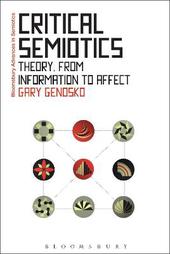
|
Critical Semiotics: Theory, from Information to Affect
Hardback
Main Details
Description
Critical Semiotics provides long overdue answers to questions at the junction of information, meaning and 'affect'. The affective turn in cultural studies has received much attention: a focus on the pre-individual bodily forces, linked to automatic responses, which augment or diminish the body's capacity to act or engage with others. In a world dominated by information, how do things that seem to have diminished meaning or even no meaning still have so much power to affect us, or to carry on our ability to affect the world? Linguistics and semiotics have been accused of being adrift from the affective turn and not accounting for these visceral forces beneath or generally other from conscious knowing. In this book, Gary Genosko delivers a detailed refutation, with analyses of specific contributions to critical semiotic approaches to meaning and signification. People want to understand how other people are moved and to understand embodied social actions, feelings and passions at the same time as understanding how this takes place. Semiotics must make the affective turn.
Author Biography
Gary Genosko is Professor of Communication and Digital Media Studies at the University of Ontario Institute of Technology in Toronto, Canada
ReviewsThis important contribution to the history of critical theory establishes crucial connections among information theory, semiotics, Marxist critique, and affect theory. By confronting obstacles to signification such as libidinal economies and commodification, Genosko provides a much-needed rereading of theories of signification, demonstrating that semiotics still matters in the age of big data, global consumerism, and visual media. -- Janell Watson, Professor of French, Virginia Tech, USA Just like Zizek in his critique of the Warchowski's Matrix, Genosko in his Critical Semiotics rejects the false choice between the material blue pill and the semiotic red pill. However, he does not opt for a third pill, especially not the dialectical purple one. Following Guattari and a number of his sometimes delightfully unlikely bedfellows, Genosko reiterates the call for semiotic disobedience. Most crucially, the plea is not predicated on the facile rejection of the discursive in favour of the pathic. Rather, Genosko's intricate mapping of the interface between expression and content remains necessarily contingent. Hence semiosis as a critique, a must-read for those living under the regime of semiocapitalism. -- Andrej Radman, Assistant Professor of Architecture, Delft University of Technology, The Netherlands In his characteristic rigour, precision and scholarly attention to texts, Genosko offers up a wide ranging and compelling history and theory of semiotics as both critical and creative practice. With tour de force readings of key post-structualist thinkers and its own original insights and contemporary case studies, this book effectively re-writes sign and affect theory. A must for all those working at the leading edge of the theoretical humanities. -- Simon O'Sullivan, Reader in Art Theory and Practice, Goldsmiths, University of London, UK
|